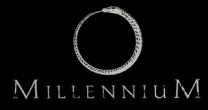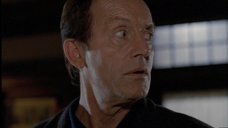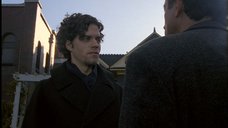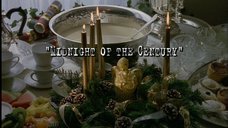#MLM-211 Midnight of the Century
Previous
|
Next
Episode Summary
Christmas Eve and the anniversary of his mother's death bring Frank Black into confrontations with Catherine, his estranged father, and even an angel. All the painful memories and arguments serve a purpose, however, in helping to steer Frank in the right direction for dealing with some important decisions regarding Jordan and the gifts she's inherited.
Main Crew
Written by Erin Maher & Kay Reindl
Directed by Dwight Little
Edited by George R. Potter
Main Cast
Lance Henriksen as Frank Black
Megan Gallagher as Catherine Black
Guest Stars
Allan Zinyk as Brian Roedecker
Darren McGavin as Henry Black
Kristen Cloke as Lara Means
Supporting Cast
Cheryl McNamara as Linda Black
Gerry Currie as Simon
Jessica Schreier as Barbara Watts
Donny Lucas as Balthazar
Tim Bissett as Melchior
Trevor White as Caspar
Uncredited Cast
Andrew Binks as Neil
More...
Quotation/Proverb
None
Seasonal Episode Tagline
this is ... who we are ... the time is near
Biblical Reference
Timestamp: 9:21
Daniel 9:21 refers:
"Yea, while I was speaking in prayer, even the man Gabriel, whom I had seen in the vision at the beginning, being caused to fly swiftly, touched me about the time of the evening oblation."
Credit: dontbesodark of TIWWA
Balthazar, Caspar, and Melchior (the toy store clerks who recommend gifts for Jordan to a frustrated Frank) were named after The Three Wise Men.
Credit: The Millennium FAQ
Synopsis
Please note that this is the original Fox synopsis and occasionally this may differ from the events that were actually filmed. Please also view the Midnight of the Century episode transcript which has been painstakingly checked for accuracy against the actual episode.
In flashback, five-year-old Frank Black draws the form of an angel. A woman, her face unseen, writes the date "12/24/1946" on the bottom of the paper. In the current day, Frank returns home with an armload of Christmas decorations and gifts. He listens to messages on his answering machine, the first a reminder from Jordan regarding her upcoming Christmas pageant, the second from Frank's estranged father. Without listening to the entire message, Frank deletes all calls. Shortly thereafter, Frank receives a Christmas card bearing the likeness of an angel. Frank turns the card over and examines the postmark, which is dated "December 24, 1946."
Jordan and Catherine pay Frank a visit on Christmas Eve. Jordan shows Roedecker one of her Christmas presents, a virtual pet --. which turns out to be the same gift Frank purchased for his daughter. Frank travels to a toy store to buy Jordan a different gift. There he experiences a vision from his childhood, one in which he asks his sickly mother, Linda, for a toy. When the flashback ends, Frank is assisted by three store clerks: Caspar, Balthazar and Melchior. The men attempt to steer Frank towards a specific toy, but Frank insists on a Danny Dinosaur doll. When Frank exits the store, he sees the image of a young man, Simon, reflected in a shop window where an angel mannequin presides over a Nativity scene. Simon says "tomorrow and tomorrow and tomorrow," words said by Frank's mother in his vision. But when Frank whirls around, Simon has disappeared.
When Frank attends Jordan's pageant, he again sees Simon, this time standing in the back of the church. He follows the vision outside, into the churchyard. Simon explains that ghosts, or fetches, the souls of those who are destined to die during the following year, make "their way to the church in search of those who will soon be their companions." Later, after the pageant ends, Catherine shows him a piece of paper containing a crudely drawn angel made by her daughter--who claims she was assisted by her dead grandmother.
Frank realizes Jordan received Danny Dinosaur as a Christmas gift the previous year. He returns to the toy store, where he asks the three clerks for a doll. The clerks point him in the direction of an aisle containing a variety of dolls--including an angel. But when he picks up the angel, its face transforms into a hideous death mask. Though the doll returns to its proper form, an angry and frustrated Frank marches out of the store empty-handed. Frank returns home and retrieves a piece of paper from a box of personal memorabilia. On the paper is an angel identical to the one drawn by Jordan.
Frank invites Lara Means to his house to discuss the events of the past day. Lara describes how she first began feeling the presence of angels, and how, one day, she accurately predicted the death of her father's business associate. She has been seeing angels--whom she believes are messengers--ever since. Lara concludes that the angels are attempting to communicate with Frank.
Frank returns to his father Henry's house. There, he enters the room where his mother died by herself. He discovers that every inch of wall space has been covered with images of angels. In flashback, Frank recalls his mother saying goodbye to him for the very last time. Afterward, Henry describes how Linda first predicted the death of her brother, Joe, during the invasion of Normandy in 1945. Though Henry believed his wife's words, he feared she might be institutionalized if word of her ability spread. Eventually, Linda's prescience tore them apart. Finally, Linda foretold her own death.
Though Henry admits he believed her, he nonetheless acted as if Linda was crazy. Before she died, Linda told Henry she would move an angel figurine "from the other side," as proof she was waiting for him. But the angel still sits, just as it had been left many years earlier, covered with dust. Frank shows his father the angel Jordan drew. With tears in his eyes, Henry picks up the dusty angel figurine, and hands it to his son - a gift for Jordan. Frank meets Jordan and Catherine at church. When Frank gives Jordan the angel figurine, she says, "Grandma wants me to have it." Frank and his daughter then gaze upon the churchyard, where they see ghostly fetches... one of whom is Henry. Frank watches as the specters vanish, comforted that he has made peace with his father.
Background Information and References
Peter Watts spoke with Frank Black and Lara Means within his study: "You know that for almost the entire history of Western civilization, this month has been a holy time? The Druids, winter solstice, Hanukkah - the Romans converted Saturnalia into Christmas. Imagine that: Christ wasn't even born on this day, maybe not even 1,997 years ago. So no one knows for sure when the millennium really begins and ends. Or how much time is left."
Saturnalia (from the god Saturn) was the name the Romans gave to their holiday marking the Winter Solstice. Over the years, it expanded to a whole week, the 17 December to 23 December. It also degenerated from mostly tomfoolery, marked chiefly by having masters and slaves switch places, to sometimes debauchery, so that among Christians the (lower case) word "saturnalia" came to mean "orgy".
It was traditional for Romans to exchange gifts during this holiday. These gifts were customarily made of silver, although nearly anything could be given as a gift for the occasion. Several epigrams by the poet Martial survive, seemingly crafted as riddling gift-tags for gifts of food.
The customary greeting for the occasion is "Io, Saturnalia!" - io (pronounced "yo") being a Latin interjection related to "ho" (as in "Ho, praise to Saturn").
It has been postulated that Christians in the fourth century assigned December 25th as Christ's birthday (and thus Christmas) because pagans already observed this day as a holiday. This would sidestep the problem of eliminating an already popular holiday while Christianizing the population. It created other problems because of the coexistence of the two feasts: see Bishop Asterius of Amasea's New Year's sermon in AD 400, discussed at the entry Lord of Misrule. The medieval celebration of the Feast of Fools was another continuation of Saturnalia into the Christian era.
Seneca the younger wrote about Rome during Saturnalia around AD 50:
It is now the month of December, when the greatest part of the city is in a bustle. Loose reins are given to public dissipation; everywhere you may hear the sound of great preparations, as if there were some real difference between the days devoted to Saturn and those for transacting business....Were you here, I would willingly confer with you as to the plan of our conduct; whether we should eve in our usual way, or, to avoid singularity, both take a better supper and throw off the toga. - From Epistulae morales ad Lucilium
See: Wikipedia - Saturnalia for additional information on the Roman holiday Saturnalia and for related references.)
Credit: The Old Man of TIWWA
Hanukkah is a Jewish holiday, also known as the Festival of lights. "Hanukkah" is a Hebrew word meaning "dedication". It also has other spellings in English, such as Chanukah, Hannukah, Hanukah, Chanuka, Chanukkah, Hanuka, Channukah, Hanukka, Hanaka, Haneka, Hanika and Khanukkah. The first evening of Hanukkah starts after the sunset of the 24th day of the Hebrew month of Kislev, and the holiday is celebrated for eight days. Since in Jewish tradition the calendar date starts at sunset, Hanukkah begins on the 25th.
Credit: Wikipedia (Please consult this entry for additional information on Hanukkah and for related references.)
Episode Trivia
Maher and Reindl's next episode, "Midnight of the Century," examined Frank's relationship with his emotionally withdrawn father (Darren McGavin). The two writers had drawn the assignment of scripting "a scary Christmas episode." They rented every scary Christmas movie they could find, like SILENT NIGHT, DEADLY NIGHT. "We came up with the idea of doing `A Christmas Carol' with Frank," Reindl said. "The three ghosts would be serial killers of the past, present and future. We pitched our board, and after the first act, Glen said, `Did we talk about this at all?' And we said, `Well, not really, just generally.' He said, `Well, we have this scene in the Halloween episode.'" The scene Reindl and Maher had written was a flashback where a youthful Frank discovered his neighbor was a murderer. While not identical to the flashbacks in "The Curse of Frank Black," it was close enough that it was jettisoned. At that point, Morgan gave new instructions about the episode: while he didn't want a scene that close to "The Curse of Frank Black," he wanted the Christmas episode to be similar in that it would be a day in the life of Frank Black, rather than have Frank investigating a case. "It was Frank being guided along some kind of spiritual journey," said Maher. "Since it was a Christmas episode, we wanted to deal with Frank's family. It was a good opportunity to show some of his past with his father. Originally we had talked about Johnny Cash as Frank's dad, but then he got sick. And then of course we were very jazzed to get Darren McGavin. The Night Stalker as Frank's father! It was so perfect. We could not have asked for a better performance.
"We were thinking about Frank's visions, and we thought if one of his parents had visions, that would mean something, since his daughter Jordan has them," Maher added. "It's something that's passed from generation to generation. So we decided that his mother would have visions too, mainly because last year in `Sacrament,' the episode with Frank's brother, we got a very strong impression that Frank and his father weren't very close and that his father was very remote and very strict. We were wondering why that was. And Frank and his brother never talked about their mother. So we came up with the idea of Frank's mother dying when he was six years old, and he really didn't understand how deep his father's love was, so he blamed his father for letting her die alone. We also thought about the idea that Christmas is always supposed to be this perfect family holiday, but Frank's family has split up--he's without his wife and child. He really doesn't have a good relationship with his dad. It's sort of the Christmas that you end up with, rather than the Christmas that you really want." This time, Reindl noted, by reconciling with his father and enjoying with Catherine a Christmas pageant in which daughter Jordan appeared, Frank finally got the Christmas that he wanted.
Source: "TV's Best Kept Secret Improves In Its Sophomore Season" - Cinefantastique Magazine (1998).
Episode Bloopers
Frank's mother died in 1946. In Walkabout (season 1) the date of birth given for David Marx (Frank's alias) is 21 July 1947, which is also shown as Frank's date of birth in the last episode Goodbye To All That in the Millennium Group's folder that Watts gives to Frank.
Credit: Fourth Horseman of TIWWA
Flash forward to the scene where Laura comes over to Frank's house carrying a bag of goodies, fat-free eggnog, two different kinds of breads, etc. As Frank answers the door, we see Lara standing with her hair neatly styled, with a very nice jacket, but no hood. As she walks thru the house and they banter back and forth, she proceeds into the living room where the pictures of the angels that both Frank and Jordan have drawn now lie on the coffee table.
Take a second and look outside the window. Its freaking pouring, yet, Lara doesn't shake her coat off, she casually takes it off and then lays it on the sofa she is about to sit on... her hair is perfectly in place and she appears bone dry.
Secondly, look at the rain falling outside that window, when Frank originally answered the door, there is no indication at the front door whatsoever that it is raining.
Credit: Fourth Horseman of TIWWA
Original Fox Promotional Episode Stills
View the 10 available original 1996 Fox Millennium Episode Guide images for this episode of Millennium here.
Mortality Count:
0 Deaths
(Comprised of 0 murders + 0 kills in self defence + 0 justifiable homicides + 0 suicides.)
NB. Where applicable, large groups of victims (such as multiple victims in a plane crash) are represented by a count of group count of 1 due to impracticalities with listing so many unidentified persons. For enhanced details, see the Violence Markers below.
Violence Markers
(View Millennium's Violence - Deaths, Killers, Victims and Criminality Analysis)





